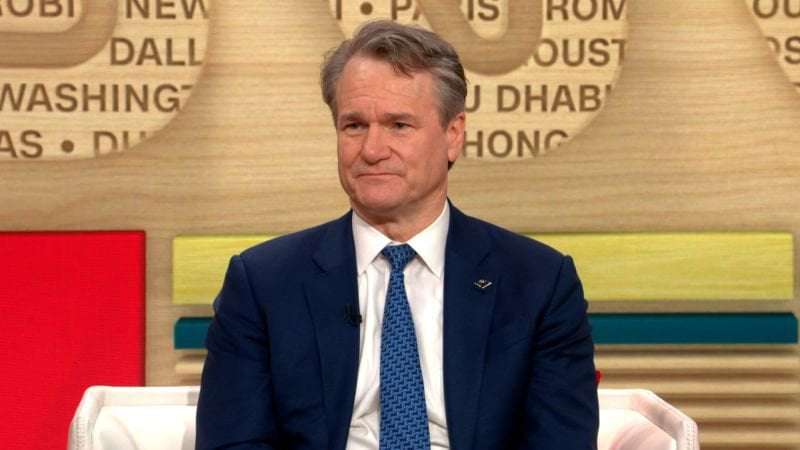Congress is once again bickering about raising the debt ceiling, the amount of money the US government can borrow to pay its bills on time. And that means that Corporate America has to be ready for the worst.
The CEO of Bank of America (BAC), America’s second-largest bank, told CNN he hopes lawmakers resolve their issues, because the market and economy love stability. Yet defaulting on the country’s debt remains a possibility that cannot be ignored.
“We have to be prepared for that, not only in this country but in other countries around the world,” Bank of America CEO Brian Moynihan told Poppy Harlow on “CNN This Morning” Monday. “You hope it doesn’t happen, but hope is not a strategy — so you prepare for it.”
President Joe Biden may touch on the topic in Tuesday’s State of the Union address. US Treasury Secretary Janet Yellen has already warned Congress that the country could default on its financial obligations as soon as June if the debt ceiling is not raised before then.
Yellen subsequently said there could be a “global financial crisis” if there is no debt limit agreement. The Treasury Department is now taking “extraordinary measures” to continue paying bills on time.
The latest drama about the debt ceiling has led to some calls for the government to get rid of it entirely. The argument is that political squabbles shouldn’t prevent the US from meeting its financial commitments.
Moynihan isn’t a fan of that idea. He told Harlow that “there’s got to be an argument about how we make sure we live within our means as a country” when asked whether or not the US should eliminate the debt ceiling.
“Congress has the purse strings. i would be careful about trying to restructure the US Constitution,” he said. “I think we should leave it alone and make sure it operates correctly.”
But he conceded that the government has needed to spend a lot more on various stimulus programs since 2020 due to the Covid-19 crisis, saying that the US had to take on “a lot of debt over the past couple of years to overcome the pandemic drag on the economy.”
The economy has rebounded sharply from the depths of the brief Covid downturn. So much so that inflation is now arguably the biggest problem facing the country, as well as the Federal Reserve.
The Fed has raised rates aggressively for the past year to try to choke off inflation. The rate hikes have started to work, but the US job market remains shockingly strong.
“The unemployment rate has stayed very low. Extremely low,” Moynihan told Harlow. “That’s one of the challenges for the Fed.”
With that in mind, Moynihan said, Bank of America is still predicting a “mild recession” at some point in the future — but the start date keeps getting pushed. He argues that higher rates could be a drag on corporate profits, but the good news is most people are still working, earning good wages and spending.
Moynihan also didn’t seem overly concerned that any geopolitical tension between the US and China stemming from the recent spy balloon incident will have a lasting impact on the global economy.
He told Harlow that given China’s importance in the global supply chain, it’s in everyone’s interests to not have any economic tensions escalate.
“It’s interesting to watch the shadowboxing between these two countries,” Moynihan said. “But the best thing in the world is to have free trade.”

nednobbins on February 6th, 2023 at 19:54 UTC »
The is absolutely insane.
Modern economics uses an extremely important number that we call the "risk free rate of return" and abbreviate as Rf.
This value is fundamental to modern finance. It's the number that let's you find the current value of any guaranteed future payment.
Economists combine this with other risk factors to do most of the predictive modeling you've ever heard of. Stock pricing models, Black-Scholes even simple mortgage calculations.
The thing is, nobody really knows the true value of RF. All we can do is observe actual rates of return and assume that Rf is some part of it.
In practice, we use US government debt to estimate Rf. Why? Because, historically, it's the only interest rate that reflected 0 investor expectation of default.
The US has never defaulted. Ever. And this is the really strict definition of default where even a second late payment would count. The US hasn't done it.
Historically, the US has been so reliable about paying back debt that investors assume that the US will always do so. If you lend the US money, you will 100% get your money back, on time and with all interest owed, come hell or high water.
Right now the US has a perfect record on debt repayment.
There's no way to get from a nearly perfect record back to a perfect record.
Thatbesus on February 6th, 2023 at 19:15 UTC »
What will this mean for other government employees? Like state employees are often funded by state or county budgets but that is with money coming down from the feds. If we default, that money doesn’t come.
TheBirdBytheWindow on February 6th, 2023 at 18:30 UTC »
I'm out of the loop I guess, but I thought this was squared away?
And if it isn't, what would this mean for everyone if we did default?